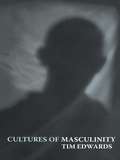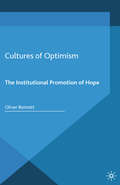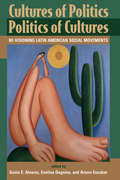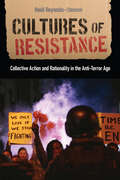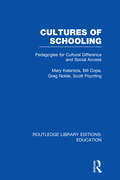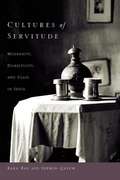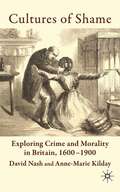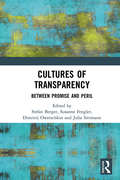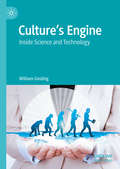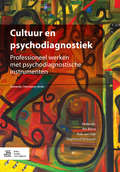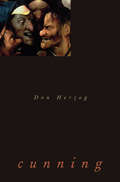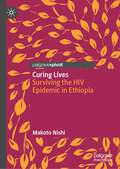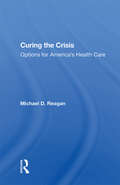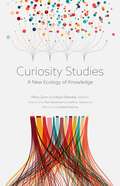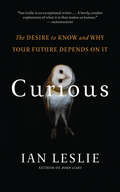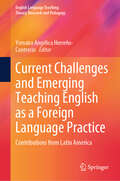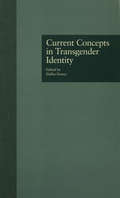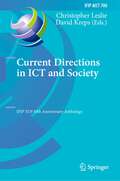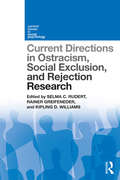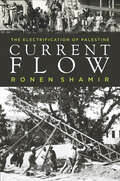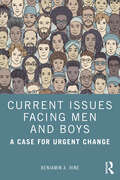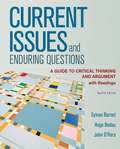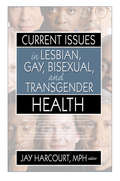- Table View
- List View
Cultures of Masculinity
by Tim EdwardsPresenting a survey of the social, cultural and theoretical issues which surround and inform our understanding of masculinity, this book explores the interface between traditional sociological approaches and the work covered by more post-structural, media-driven or cultural perspectives. Edwards well known for his work on representations of masculinities, uses grounded examples of the job market and domestic violence to set his theoretical discussion. He argues that there is a need for more dialogue on men and masculinities between disciplines, and considers the validity of the concerns and anxieties which surround masculinity in the contemporary world through a range of key topics, including: the new man, the new lad and ‘men’s movements’ men, masculinity and violence marginalized masculinities: black masculinity and gay male sexuality queer theory, performativity and fashion cinema, representation and the body. One of the most comprehensive and progressive studies of modern masculinity available, this book will be essential reading for students of gender, culture and sociology.
Cultures of Milk
by Andrea S. WileyMilk is the only food mammals produce naturally to feed their offspring. The human species is the only one that takes milk from other animals and consumes it beyond weaning age. Cultures of Milk contrasts the practices of the world's two leading milk producers, India and the United States. In both countries, milk is considered to have special qualities. Drawing on ethnographic and scientific studies, popular media, and government reports, Andrea Wiley reveals that the cultural significance of milk goes well beyond its nutritive value. Shifting socioeconomic and political factors influence how people perceive the importance of milk and how much they consume. In India, where milk is out of reach for many, consumption is rising rapidly among the urban middle class. But milk drinking is declining in America, despite the strength of the dairy industry. Milk is bound up in discussions of food scarcity in India and food abundance in the United States. Promotion of milk as a means to enhance child growth boosted consumption in twentieth-century America and is currently doing the same in India, where average height is low. Wiley considers how variation among populations in the ability to digest lactose and ideas about how milk affects digestion influence the type of milk and milk products consumed. In India, most milk comes from buffalo, but cows have sacred status for Hindus. In the United States, cow's milk has long been a privileged food, but is now facing competition from plant-based milk.
Cultures of Optimism: The Institutional Promotion of Hope
by Oliver BennettWhat are the functions of optimism in modern societies? How is hope culturally transmitted? What values and attitudes does it reflect? This book explores how and why powerful institutions propagate 'cultures of optimism' in different domains, such as politics, work, the family, religion and psychotherapy.
Cultures of Politics, Politics of Cultures: Revisioning Latin American Social Movements
by Sonia E Alvarez<p>Investigating the complex interrelations between culture and politics in a wide range of social movements in Latin America, this book focuses on the cultural politics enacted by social movements as they struggle for new visions and practices of citizenship, democracy, social relations, and development. The volume explores the potential of these cultural politics for fostering alternative political cultures and social transformations. Theoretical and empirical chapters assess and build upon novel conceptions of culture and politics in a variety of disciplines and fields—particularly anthropology, political science, sociology, feminist theory, and cultural studies. <p>The notion of the cultural politics of social movements provides a lens for analyzing emergent discourses and practices grounded in society and culture, the state and political institutions, and the extent to which they may unsettle, or be reinscribed into, the dominant neoliberal strategies of the 1990s. Contributors explore how social movements—urban popular, women's, indigenous, and black movements as well as movements for citizenship and democracy—engage in the cultural resignification of notions such as rights, equality, and difference, thus altering what counts as political. By highlighting simultaneously the cultural dimensions of the political and the political dimensions of the cultural, the book transcends the distinction between “new” and “old” social movements and thus significantly renews our understanding of them.</p>
Cultures of Resistance: Collective Action and Rationality in the Anti-Terror Age (Critical Issues in Crime and Society)
by Heidi Reynolds-StensonCultures of Resistance provides new insight on a long-standing question: whether government efforts to repress social movements produce a chilling effect on dissent, or backfire and spur greater mobilization. In recent decades, the U.S. government’s repressive capacity has expanded dramatically, as the legal, technological, and bureaucratic tools wielded by agents of the state have become increasingly powerful. Today, more than ever, it is critical to understand how repression impacts the freedom to dissent and collectively express political grievances. Through analysis of activists’ rich and often deeply moving experiences of repression and resistance, the book uncovers key group processes that shape how individuals understand, experience, and weigh these risks of participating in collective action. Qualitative and quantitative analyses demonstrate that, following experiences of state repression, the achievement or breakdown of these group processes, not the type or severity of repression experienced, best explain why some individuals persist while others disengage. In doing so, the book bridges prevailing theoretical divides in social movement research by illuminating how individual rationality is collectively constructed, mediated, and obscured by protest group culture.
Cultures of Schooling: Pedagogies for Cultural Difference and Social Access (Routledge Library Editions: Education)
by Bill Cope Mary Kalantzis Scott Poynting Greg NobleThis volume examines the ways schools respond to cultural and linguistic diversity. A richness of accumulated experience is portrayed in this study of six Australian secondary schools; partial success, near success or instructive failure as the culture of the school itself was transformed in an attempt to meet the educational needs of its students. Set in the context of a general historical background to the development of multicultural education in Australia, a theoretical framework is developed with which to analyze the move from the traditional curriculum of cultural assimilation to the progressivist curriculum of cultural pluralism. The book analyzes the limitations of the progressivist model of multicultural education and suggests a new ‘post-progressivist’ model, in evidence already in an incipient and as yet tentative ‘self-corrective’ trend in the case-study schools.
Cultures of Servitude
by Raka Ray Seemin QayumFocusing on the Kolkata (formerly Calcutta) in West Bengal, Ray (India studies and sociology, U. of California-Berkeley) and historical anthropologist Qayum examine the characteristics of domestic servitude historically and culturally, and the constitution of the classes on both side of the employer-servant relationship. Their perspectives include colonial legacies and spatial transformations, between family retainer and freelancer, the failure of patriarchy, the cultivation and cleavage of distinction, and traveling cultures of servitude. Annotation c2010 Book News, Inc. , Portland, OR (booknews. com)
Cultures of Shame
by David Nash Anne-Marie KildayThe first systematic study of the concept of shame from 1600-1900, showing good and bad behaviour, morality and perceptions of crime in British society at large. Single episodes in the history of shame are contextualized by discussing the historiography and theory of shame and their implications for the history of crime and social relations.
Cultures of Transparency: Between Promise and Peril
by Stefan BergerThis volume addresses the major questions surrounding a concept that has become ubiquitous in the media and in civil society as well as in political and economic discourses in recent years, and which is demanded with increasing frequency: transparency. How can society deal with increasing and often diverging demands and expectations of transparency? What role can different political and civil society actors play in processes of producing, or preventing, transparency? Where are the limits of transparency and how are these boundaries negotiated? What is the relationship of transparency to processes of social change, as well as systems of social surveillance and control? Engaging with transparency as an interrelated product of law, politics, economics and culture, this interdisciplinary volume explores the ambiguities and contradictions, as well as the social and political dilemmas, that the age of transparency has unleashed. As such it will appeal to researchers across the social sciences and humanities with interests in politics, history, sociology, civil society, citizenship, public policy, criminology and law.
Cultures, Citizenship and Human Rights (Routledge Advances in Sociology)
by Antoine Buyse Rosemarie Buikema Antonius RobbenIn Cultures, Citizenship and Human Rights the combined analytical efforts of the fields of human rights law, conflict studies, anthropology, history, media studies, gender studies, and critical race and postcolonial studies raise a comprehensive understanding of the discursive and visual mediation of migration and manifestations of belonging and citizenship. More insight into the convergence – but also the tensions – between the cultural and the legal foundations of citizenship, has proven to be vital to the understanding of societies past and present, especially to assess processes of inclusion and exclusion. Citizenship is more than a collection of rights and privileges held by the individual members of a state but involves cultural and historical interpretations, legal contestation and regulation, as well as an active engagement with national, regional, and local state and other institutions about the boundaries of those (implicitly gendered and raced) rights and privileges. Highlighting and assessing the transformations of what citizenship entails today is crucially important to the future of Europe, which both as an idea and as a practical project faces challenges that range from the crisis of legitimacy to the problems posed by mass migration. Many of the issues addressed in this book, however, also play out in other parts of the world, as several of the chapters reflect. This book is available for free in PDF format as Open Access from the individual product page at www.routledge.com. They have been made available under a Creative Commons Attribution-Non Commercial-No Derivatives 4.0 license.
Culture’s Engine: Inside Science and Technology
by William GoslingCulture’s Engine offers an insightful and penetrating analysis of the enduring relationship between technology and society. William Gosling explores in absorbing historical detail how humans have experienced change through a sequence of technological revolutions, each giving rise to new social organisation, which in turn influences the shape and timing of the next such revolution. Gosling argues that it is through this dialogue that successful technology sets the direction and pace of all cultural evolution. The state of technology at any time is the major influence on the world, and not just the material world. This book then is not a history of technology, still less of science. It fundamentally questions how technology and social forces interact, leading to these successive revolutions and their outcomes.
Cultuur en psychodiagnostiek: Professioneel werken met psychodiagnostische instrumenten
by Ria Borra Rob Van Dijk Raymond VerboomTal van psychodiagnostische instrumenten zijn niet gevalideerd voor etnisch-culturele minderheidsgroepen in Nederland. In dit boek, bedoeld voor de interculturele hulpverleningspraktijk van de GGZ, worden de problemen in de interculturele psychodiagnostiek geschetst. Er worden methoden aangereikt hoe op een professionele manier deze problemen het hoofd te bieden. Aan de hand van casuïstiek geven ervaren interculturele hulpverleners inzicht in hoe psychologische instrumenten kunnen worden toegepast op een cultuur sensitieve manier. De regulatieve cyclus wordt gebruikt als een methodisch handvat voor een zorgvuldig, systematisch en reflexief handelen in dit psychodiagnostische proces.
Cunning
by Don HerzogWant to be cunning? You might wish you were more clever, more flexible, able to cut a few corners without getting caught, to dive now and again into iniquity and surface clutching a prize. You might want to roll your eyes at those slaves of duty who play by the rules. Or you might think there's something sleazy about that stance, even if it does seem to pay off. Does that make you a chump? With pointedly mischievous prose, Don Herzog explores what's alluring and what's revolting in cunning. He draws on a colorful range of sources: tales of Odysseus; texts from Machiavelli; pamphlets from early modern England; salesmen's newsletters; Christian apologetics; plays; sermons; philosophical treatises; detective novels; famous, infamous, and obscure historical cases; and more. The book is in three parts, bookended by two murderous churchmen. "Dilemmas" explores some canonical moments of cunning and introduces the distinction between knaves and fools as a "time-honored but radically deficient scheme." "Appearances" assails conventional approaches to unmasking. Surveying ignorance and self-deception, "Despair?" deepens the case that we ought to be cunning--and then sees what we might say in response. Throughout this beguiling book, Herzog refines our sense of what's troubling in this terrain. He shows that rationality, social roles, and morality are tangled together--and trickier than we thought.
Curing Lives: Surviving the HIV Epidemic in Ethiopia
by Makoto NishiThis is a book about life during the HIV epidemic in Ethiopia, and seeks to understand how and why the global effort to achieve universal HIV treatment has shifted away from its initial focus on the excessive human suffering precipitated by the epidemic. When antiretroviral drugs became available in Ethiopia, they emerged as powerful agents of change: not only did they cure individuals, they also helped people overcome their fear of – and break the silence around – AIDS, while healing the social ruptures caused by the epidemic. Nevertheless, as this book argues, the very same agents have silently “reversed” these changes over the course of the past decade. These reversals have dissolved connections, re-incurred invisible social fissures, and allowed a large majority of people to stay indifferent to the suffering of individuals whose lives remain vulnerable under the current treatment regime. This whole process is a product of neoliberal global health interventions that determine which lives are worthy or unworthy of investment. This book will interest scholars of biopolitics and public health, those who study the developing world, and those interested in how pandemic interventions alter the lives of many.
Curing The Crisis: Options For America's Health Care
by Michael D ReaganWith private health insurance costs averaging over $300 per month, per person-and with 36 million Americans lacking coverage of any sort-it is easy to understand why health care has captured the public imagination as the domestic policy issue of the 1990s. Americans spend well over $800 billion a year on health care, yet we are neglecting ba
Curiosity Studies: A New Ecology of Knowledge
by Perry Zurn Arjun ShankarThe first English-language collection to establish curiosity studies as a unique field From science and technology to business and education, curiosity is often taken for granted as an unquestioned good. And yet, few people can define curiosity. Curiosity Studies marshals scholars from more than a dozen fields not only to define curiosity but also to grapple with its ethics as well as its role in technological advancement and global citizenship. While intriguing research on curiosity has occurred in numerous disciplines for decades, no rigorously cross-disciplinary study has existed—until now. Curiosity Studies stages an interdisciplinary conversation about what curiosity is and what resources it holds for human and ecological flourishing. These engaging essays are integrated into four clusters: scientific inquiry, educational practice, social relations, and transformative power. By exploring curiosity through the practice of scientific inquiry, the contours of human learning, the stakes of social difference, and the potential of radical imagination, these clusters focus and reinvigorate the study of this universal but slippery phenomenon: the desire to know. Against the assumption that curiosity is neutral, this volume insists that curiosity has a history and a political import and requires precision to define and operationalize. As various fields deepen its analysis, a new ecosystem for knowledge production can flourish, driven by real-world problems and a commitment to solve them in collaboration. By paying particular attention to pedagogy throughout, Curiosity Studies equips us to live critically and creatively in what might be called our new Age of Curiosity.Contributors: Danielle S. Bassett, U of Pennsylvania; Barbara M. Benedict, Trinity College; Susan Engel, Williams College; Ellen K. Feder, American U; Kristina T. Johnson, Massachusetts Institute of Technology; Narendra Keval; Christina León, Princeton U; Tyson Lewis, U of North Texas; Amy Marvin, U of Oregon; Hilary M. Schor, U of Southern California; Seeta Sistla, Hampshire College; Heather Anne Swanson, Aarhus U.
Curious: The Desire to Know and Why Your Future Depends On It
by Ian LeslieThe latest from Ian Leslie, the author of Born Liars, a Globe and Mail Top 100 Book, is a fascinating look at the human characteristic of curiosity — our extraordinary capacity to take pleasure in discovering, learning, and understanding.Curious shows how the practice of “deep curiosity” — persistent, self-reflective seeking of knowledge and insight — is key to the success of our careers, the happiness of our children, the strength of our relationships, and the progress of societies. But it also argues that it is a fragile quality, which wanes and waxes over time, and that we take it for granted at our peril. Ian Leslie proposes that the Internet is opening up a “curiosity gap,” by exacerbating the divide between those with a large cognitive appetite, and those happy knowing no more than they have to know; between the curious and the incurious. He draws on many sources and stories to illustrate his points: Benjamin Franklin at Portsmouth Harbour studying the effect of oil on choppy waters; a bored Galileo distracting himself in a Pisa cathedral by observing the swinging of a recently lit lamp; Leonardo da Vinci doodling ideas in his notebook; Google co-founder Larry Page’s thoughts on the perfect search engine; the invention of the microwave oven; the advantages of your local bookseller over Amazon’s algorithms; a reassessment of Donald Rumsfeld’s defense strategy, and many more.Rich, textured, and exciting, Curious is a new take on the most absorbing human trait of all.
Current Challenges and Emerging Teaching English as a Foreign Language Practice: Contributions from Latin America (English Language Teaching: Theory, Research and Pedagogy)
by Yomaira Angélica Herreño-ContrerasThis book brings together contributions on current challenges in Teaching English as a Foreign Language (TEFL) in Latin America. It examines various issues related to two areas within TEFL: first, in-class activities and innovative approaches, focusing on the development of intercultural competence, technology-based teaching and learning practices, grammar learning and digital life and its repercussions in English learning. Second, teacher education and professional development, analyzing aspects such as source-based writing skills, Lingua Franca and World Englishes, post-pandemic face-to-face instruction and literature in English as a Foreign Language (EFL) Teacher Education Programs along with studies on job satisfaction, attrition and professional identity. Specifically, the chapters provide an overview of the EFL teacher and classroom in Latin America, and the demands, benefits and drawbacks observed in this sociocultural context. Each chapter also includes meaningful views from a Latin American context and contributes to the development of better EFL teaching and learning practices worldwide. This book is a useful reference for scholars, researchers, and educators who focus on EFL teaching and learning at any educational level in Latin America. It is also a helpful resource for trainee teachers delving further into their fields.
Current Concepts in Transgender Identity (Garland Gay and Lesbian Studies #11)
by Dallas DennyFirst published in 1998. Routledge is an imprint of Taylor & Francis, an informa company.
Current Directions in ICT and Society: IFIP TC9 50th Anniversary Anthology (IFIP Advances in Information and Communication Technology #700)
by David Kreps Christopher LeslieThis project was motivated by the upcoming fiftieth anniversary of the IFIP Human Choice and Computers (HCC) conference, the event that led to IFIP’s Technical Committee 9 (TC 9). Although IFIP committees are mainly technical, TC 9 is dedicated to research at the intersection of information and communication technology (ICT) with society. In addition to sponsoring HCC, TC 9 supports groups that have specific research interests. In consultation with their members, the leaders of each group offer chapters about their groups’ history and goals. An additional chapter describes TC 9’s formation, and an appendix details the national groups that work closely with TC 9. Overall, this volume is a useful guide to the historical development of research on ICT and society, providing readers with important reference works and relevant themes, and also points to likely new trends in these domains.
Current Directions in Ostracism, Social Exclusion and Rejection Research
by Rainer Greifeneder Selma Rudert Kipling WilliamsThis edited volume provides an up-to-date review of current research on ostracism, social exclusion, and rejection. The book shows why exclusion and rejection occur, how they affect the excluded individuals, and the consequences they might have for individuals and organizations. Ostracism, social exclusion, and rejection are common phenomena, both at the individual level, such as ostracism in the classroom or at the workplace, as well as on a societal or even global scale, such as immigration or asylum policies. Examining key concepts such as the long-term effects of ostracism, the developmental and cultural perspective on ostracism, and the detrimental impact that social exclusion may have on individuals and societies, the authors provide an up-to-date overview of the research field and present new conceptual models and methodological approaches. Featuring discussion of promising areas, novel pathways for research, and cutting-edge developments, this is the most comprehensive bringing-together of research on this topic. The book gives both a broad state-of-the-art overview of the field as well as discussing cutting-edge ideas and promising areas for future research; it is essential for students, researchers of social psychology, and policy makers interested in this field.
Current Flow: The Electrification of Palestine
by Ronen ShamirWhether buried underfoot or strung overhead, electrical lines are omnipresent. Not only are most societies dependent on electrical infrastructure, but this infrastructure actively shapes electrified society. From the wires, poles, and generators themselves to the entrepreneurs, engineers, politicians, and advisors who determine the process of electrification, our electrical grids can create power#151;and politics#151;just as they transmit it. Current Flow examines the history of electrification of British-ruled Palestine in the 1920s, as it marked, affirmed, and produced social, political, and economic difference between Arabs and Jews. Considering the interplay of British colonial interests, the Jewish-Zionist leanings of a commissioned electric company, and Arab opposition within the case of the Jaffa Power House, Ronen Shamir reveals how electrification was central in assembling a material infrastructure of ethno-national separation in Palestine long before "political partition plans" had ever been envisioned. Ultimately, Current Flow sheds new light on the history of Jewish-Arab relations and offers broader sociological insights into what happens when people are transformed from users into elements of networks.
Current Issues Facing Men and Boys: A Case for Urgent Change
by Benjamin A. HineThis important book offers an accessible overview and timely examination of the unique challenges faced by men and boys in contemporary society.It covers a wide range of topics, including the male mental health crisis, the impact of media and popular culture on male identity, and issues related to body image, as well as education, work, sexual behaviour, relationships, and the evolving roles of fatherhood. Additionally, it addresses the prevalence of violence, homelessness, substance misuse, and specific issues faced by men in institutional settings like the military and prison. Written in a user-friendly style, each chapter contains summary action points and signposts to further resources where relevant. The book takes an intersectional approach throughout, which continually considers the role of gender, ethnicity, religion, culture, class, and sexuality in the lives of men and boys. It therefore serves as an inclusive and comprehensive resource for promoting a more compassionate society, highlighting the need for evidence-based interventions and strategies to foster meaningful change that supports the well-being of men and boys.Emphasizing that addressing men's issues complements and reinforces the broader fight for gender equality, this practical book is highly relevant for mental health professionals, educators, and other practitioners who are interested in understanding the unique challenges that men and boys face. It will also be useful reading for students of psychology, gender studies, sociology, health and social care, and many other subjects.
Current Issues and Enduring Questions: A Guide To Critical Thinking And Argument, With Readings
by Barnet Badau O’HaraCurrent Issues and Enduring Questions is a text and reader that serves as an extensive resource for teaching argument, persuasive writing, critical thinking, and research. It includes readings on topics that matter to students, such as being seen as “the other” and student loan forgiveness, issues that students will want to engage with and debate. Comprehensive coverage of classic and contemporary approaches to argument includes Aristotelian, Toulmin, Rogerian, and a range of alternative views, such as analyzing and writing about visual arguments. <p><p> This new edition does more than ever to make argument concepts clear, and to give students strategies for crafting effective arguments. For today’s ever-increasingly visual learners who are challenged to separate what’s real from what’s not, new activities and visual flowcharts support information literacy. Newly annotated readings highlight important rhetorical moves. And new readings explore controversial issues such as mass incarceration, cultural appropriation, and the way computer algorithms make biased decisions.
Current Issues in Lesbian, Gay, Bisexual, and Transgender Health
by Mph Jay HarcourtLearn what resources are needed for lesser-recognized LGBT health issuesMost literature that explores LGBT health issues concentrates on HIV/AIDS while leaving research studies on other vital issues lacking. Current Issues in Lesbian, Gay, Bisexual, and Transgender Health addresses this inadequacy by presenting a broad range of LGBT health issues from an interdisciplinary and mixed-method perspective. Leading experts present both quantitative and qualitative descriptions of health issues among various population groups, focusing on those topics poorly represented in present-day literature. This book is a strong start to fill in the blanks about unrealized health issues of LGBT individuals and offers insights into the resources needed to address them.Methods to assess sexual orientation and gender identity are not normally found in most population-based research. Because of the diversity within the relatively small LGBT population, research has been forced to generalize, making it less likely to effectively contribute to quality health issue data for these individuals. The research presented in Current Issues in Lesbian, Gay, Bisexual, and Transgender Health takes particular care to specify how the orientation and sexual identity of study participants was measured. This book carefully mines previously unrevealed health disparities among LGBT populations across a broad spectrum of diseases-beyond the standard focus on HIV/AIDS. The most current and important studies are presented, including rare research on transgender health issues. The chapters are extensively referenced, and several include figures and tables to clarify and enhance understanding of the information.The wide range of topics in Current Issues in Lesbian, Gay, Bisexual, and Transgender Health include: the inclusion of sexual orientation questions in research studies comparison of mental health issues between women of different sexual orientations mental health issues among men of different sexual orientations and HIV status in Australia the impact of sexual identity distress and social support in GLBT youth issues transgender youth health issues female-to-male (FTM) transexuals&’ experiences accessing health care research on LBT domestic violence survivors health needs of male-to-female (MTF) transgenders of colorCurrent Issues in Lesbian, Gay, Bisexual, and Transgender Health is crucial, thought-provoking reading for researchers working in LGBT health, public health professionals working in community health and LGBT health, policymakers, advocates, public health and community health faculty, and students interested in LGBT health issues.
